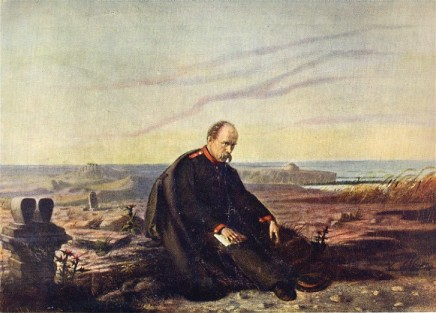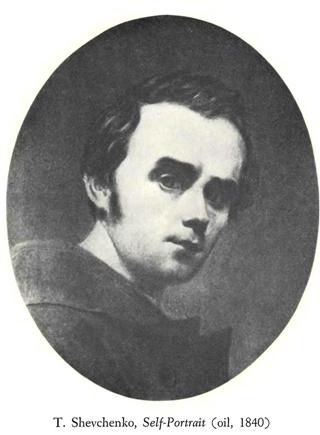TARAS SHEVCHENKO’S LIFE AND WORK
Exiled Taras Shevchenko. Private soldier in the Fortress of Orsk
(biography of the poet by C.H. Andrusyshen)
(Introduction of "The poetical works of Taras Shevchenko. The Kobzar" by Constantine Henry Andrusyshen and Watson Kirkconnell)

Kornylo Ustyianovych, Shevchenko in Exile (early 1890s)
On May 15, when he was called again for further interrogation, Shevchenko was presented with a deposition made to the presiding judges by a nineteen-year-old student Andruzky, who under pressure declared that Shevchenko had indeed taken part in the meetings of the Brotherhood; that he was in fact the most vocal of the Ukrainian party whose purpose was to restore the hetmanate in Ukraine; and that it was he who really incited the other members to subversion by glorifying Ivan Mazeppa (whom the Russians execrated as a traitor for making common cause with Charles XII of Sweden against Peter I). That deposition sealed Shevchenko's doom, and all he could do in refuting the accusation was to repeat that although he knew all the members of the Brotherhood, he had never belonged to it. Outwardly, he preserved a cool head and by his imperturbable deportment at the trial encouraged his fellow-prisoners to keep up their spirits; inwardly, however, he was dejected and angry at his Muse for having brought him and them to such a dire pass.
The indictment was drawn, and its conclusion was that Shevchenko was the greatest culprit of them all in rebelliousness, defiance, and an intransigency that knew no bounds. It was transmitted to Nicholas I by the presiding judge, Count Orlov, who suggested to the Tsar that the poet, being of strong physical constitution, be sentenced for an indefinite period to hard military service in the Orenburg regiment, with the right to clemency for good behaviour. To this written suggestion the Tsar added a personal note in his own hand that the convicted man be 'most strictly guarded and forbidden to write and paint.”
That was the harshest punishment of all. M. Hulak, who took the blame for all the Brotherhood’s activity upon himself and would not in any manner incriminate the other members, received a three-year sentence of solitary confinement in the Schliissenburg dungeon. Other penalties were less severe: Kulish and Bilozersky, four months imprisonment; Kostomariv, one year; and all were to be severally exiled to various distant Russian towns for civil service, no literary activity being allowed them. In addition, Shevchenko’s works were banned from both publication and circulation.
Immediately upon the pronouncement of the sentence Shevchenko was removed to a military prison. The very next day, composed and reconciled to his fate, he set out under heavy horse guard for Orenburg, which he reached after a ten-day journey. From there he was sent about two hundred miles further east, to the Fortress of Orsk, where he was registered as a private.
Then began for Shevchenko a life of monotony and military servitude amid the wilderness of the Kirghiz steppe. Each day he had to drill almost continually under the orders of coarse, drunken sergeants who often threatened him with birching for his awkwardness. But his suffering was much worse when after an all-day muster he found himself in the barracks where in the stench of human sweat and cheap tobacco smoke he had to listen to the intolerable din of the convicts and their inane chatter. For Shevchenko a life among this rabble was a veritable spiritual torture, to which soon was added a physical illness — rheumatism, which henceforth did not leave him. To top it all, he was presently attacked by scurvy, as a result of which his gums became diseased and his body covered with sores. This life of pain and distress is poignantly recorded in his poem, "To A. Y. Kozachkovsky,” which is the poet’s desperate de frofundis.
Some respite from those tortures Shevchenko gained from his constant readings of the Bible. In addition, the friendships he contracted with certain more humane officers in the region had a salutary effect on his melancholy state of mind. Of particular blessing was his warm relationship with the Lazarevsky brothers from Orenburg, one of whom came several times to visit him at Orsk and sent him cigars and occasionally money. He was also a welcome guest (not as a convict) at the home of the physician, M.Aleksandrivsky, where he was able to read recently published books and journals and so keep up with current events. The home of the military clerk, Lavrentiev, was also open to him, and there, in the capacity of tutor to his host's sons, he could enjoy real rest and relaxation. Certain charitable ladies likewise did their best to make life tolerable for him, particularly when they bought him a rabbit fur-coat for the cold winter season.
This amelioration in his existence lasted but six months, at the end of which the commander of the regiment, fearing untoward consequences for himself, ordered him back to the barracks. Shevchenko, after some freedom, now found his prison, by contrast, a greater “dungheap” than ever, the lowest pit of human misery. At times he longed for death; but depressive as was his mental state, he was constantly buoyed up by the hope that eventually he would be able to tear himself away from those wretched surroundings and return to his native Ukraine again.
In the meantime he besought his friends to intercede for him in St. Petersburg to have at least the prohibition to draw and paint lifted from his sentence. The interdiction to write he could well understand, but there was nothing subversive in his pictorial work. To achieve this end, Shevchenko needed the support not only of his immediate officers and friends at Orenburg and St. Petersburg, but also the good will of Count Orlov, the chief of the police at the capital, who would have to approach the Tsar personally with that petition. The matter, however, was slow even in getting started and, in spite of Princess Repnin's intercession, stagnated for months on end.
To relieve his plight, Shevchenko's friends helped him as much as they could with books, money, and other gifts. Of particular satisfaction to the poet was the receipt of Shakespeare's translated works and an entire painting gear. The Bible continued to be his constant companion, and from it he drew what consolation he needed. While in the Fortress of Orsk, Shevchenko experienced the soothing power of prayer and felt alleviation on meditating Christ's call: “Come to me, all ye that labour and are heavy laden and I will give you rest.” I his he confessed in some of the letters to his friends. Of great balm to kim also was Thomas a Kempis's Imitation of Christ.
Although strictly forbidden to write, Shevchenko nevertheless found surreptitious occasions to do so, especially when all in the barracks were asleep; but, as he relates in his “To A. Y. Kozachkovsky,” it was “like a thief” that he went about it. Whatever he wrote he recopied in minuscule script and hid it in the leggings of his military boots. By the time his exile was over, he had four such “bootleg” booklets filled with verses. In the Fortress of Orsk he wrote “The Princess” (Kniazhna]), a long poem, influenced, it is surmised, by Shakespeare's dramatism; “A Dream” (not to be confused with a previous poem bearing a similar title), in which his love of Ukraine is felt to have increased in proportion to his physical and mental sufferings; “Irzhavetz,” dealing with the miraculous, tear-shedding icon of the Virgin Mary, which, after the Cossacks' wanderings following the destruction of the Sitch, was finally brought by them to that locality and there placed in a church to continue to weep over their fate; “To A. Y. Kozachkovsky,” in which, as already mentioned, his state of mind as an exile is pitifully brought forth; “The Branded Convict” (Varnak), a bloody tale by one so marked; and a goodly number of lyrics, among them, the well-known one beginning with the line “I was some thirteen years of age,” in which his first meeting with the girl Oksana is described. The Cossack life, rich in colourful manners and customs, continued to interest Shevchenko, as can be gathered from his other poems. Many of the shorter pieces he then wrote were autobiographical, reflecting his sorrowful mood and describing the arid Asiatic wastes amid which he lived. These are quite subjective in tone, replete with plaintive, at times querulous utterances of his longing to return to the paradisical regions of his native land. To the first “bootleg” collection of his verses, Shevchenko added the thirteen lyrics he wrote in the citadel at St. Petersburg, after he had revised them. As he was meticulously searched before setting out for Orenburg, it is suggested that he smuggled these thirteen either in his boots or copied in the margins of his Bible.
Introduction written by Professor C.H. Andrusyshen
Source: The Poetical Works of Taras Shevchenko. The Kobzar. Translated from the Ukrainian by С.H. Andrusyshen and Watson Kirkconnell. Published for the Ukrainian Canadian Committee by University of Toronto Press, 1964. Toronto and Buffalo. Printed in Canada, Reprinted, 1977, p. 25 - 28.
Read more:

Introduction of "The poetical works of Taras Shevchenko. The Kobzar" by Constantine Henry Andrusyshen and Watson Kirkconnell.

